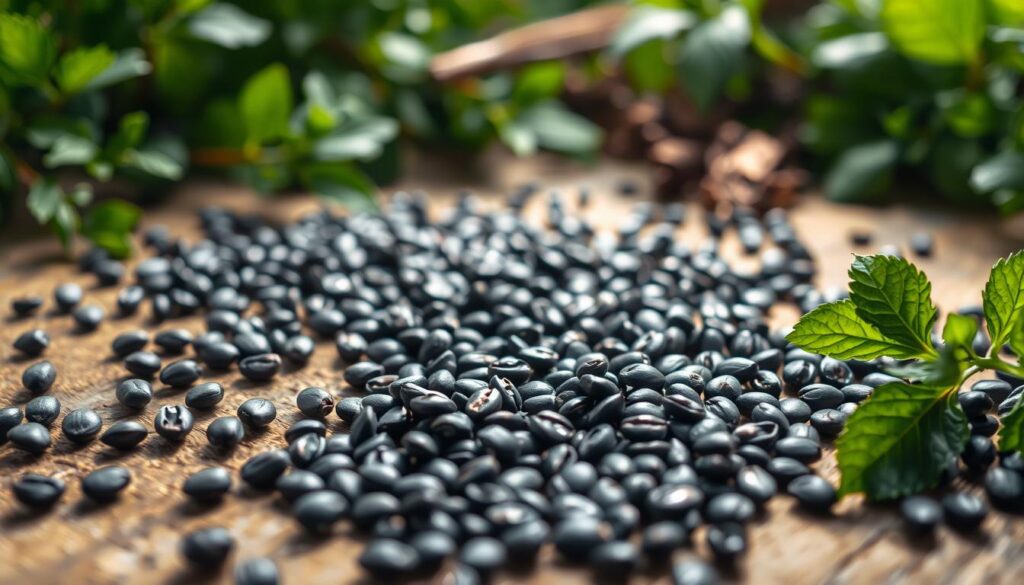Black seed, also known as Nigella sativa, has been used for centuries as a natural remedy for a wide range of health concerns. This unassuming seed has gained significant attention in the wellness community due to its impressive array of health benefits. In this article, we’ll explore the rich history, nutritional profile, and the various ways in which black seed can support overall health and well-being.
Key Takeaways
- Black seed, or Nigella sativa, has been used in traditional medicine for centuries to promote health and wellness.
- The seed is packed with essential nutrients, including healthy fats, vitamins, and antioxidants that can benefit the body in numerous ways.
- Black seed has been studied for its potential to support immune function, reduce inflammation, improve heart health, and more.
- Incorporating black seed into your diet can be done in various forms, such as oil, powder, or by including it in recipes.
- With its long history of use and growing scientific evidence, black seed is a natural health booster worth considering for overall wellness.
What is Black Seed?
Black seed, scientifically known as Nigella sativa, is a remarkable plant that has been used in traditional medicine for centuries. This small, dark-colored seed has a long and fascinating history, with roots that span across various cultures and civilizations.
Overview of Nigella Sativa
Nigella sativa is an annual flowering plant that is native to the Mediterranean region, Southwest Asia, and North Africa. The plant produces delicate white or pale blue flowers, and the seeds that grow within the seed pods are the primary focus of interest for their health benefits.
These tiny, black seeds have a distinctive flavor profile, often described as a combination of cumin, black pepper, and oregano. They have been used in traditional cuisines and medicinal practices for thousands of years, with evidence of their use dating back to ancient Egypt, Greece, and the Middle East.
Historical Uses in Traditional Medicine
The use of Nigella sativa, or black seed, in traditional medicine has a long and storied history. In ancient times, these seeds were highly valued for their purported healing properties and were used to treat a wide range of ailments, from respiratory conditions to digestive issues and even skin problems.
In the Middle East, black seed oil has been used for centuries as a natural remedy, with references to its use in the ancient texts of the region. Similarly, in Ayurvedic and Traditional Chinese Medicine, Nigella sativa has been extensively used for its therapeutic benefits.
Today, the health benefits of black seed continue to be explored and validated through modern scientific research, making it a growing focus of interest in the world of natural and integrative health.
Nutritional Profile of Black Seed
Black seed, also known as Nigella sativa, is a remarkable superfood packed with an array of beneficial nutrients. This flavorful seed boasts an impressive nutritional profile that contributes to its antioxidant properties, making it a natural health booster.
Key Nutrients Found in Black Seeds
Black seeds are a rich source of essential fatty acids, including linoleic acid and gamma-linolenic acid. They also contain significant amounts of vitamins and minerals such as:
- Vitamin B1 (thiamine)
- Vitamin B2 (riboflavin)
- Vitamin B3 (niacin)
- Vitamin B6
- Calcium
- Iron
- Copper
- Zinc
Antioxidants and Their Health Benefits
One of the standout compounds in black seeds is thymoquinone, a potent antioxidant with remarkable antioxidant properties. Thymoquinone has been extensively studied for its potential to support overall health and wellness. Research suggests that the antioxidant properties of black seeds may help combat oxidative stress and inflammation, contributing to their wide-ranging health benefits.
| Nutrient | Beneficial Effects |
|---|---|
| Thymoquinone | Anti-inflammatory, neuroprotective, cardioprotective, and anticancer properties |
| Essential Fatty Acids | Promote skin health, support brain function, and reduce inflammation |
| Vitamins and Minerals | Contribute to overall health, immune function, and energy production |

“Black seed is truly a wonder herb, packed with an incredible nutritional value and potent antioxidant properties that can support overall health and well-being.”
Immune System Support
Black seed, also known as Nigella sativa, has long been celebrated for its impressive immune-boosting properties. This tiny seed packs a powerful punch when it comes to strengthening the body’s natural defenses against a variety of threats, from common colds to more serious health concerns.
How Black Seed Strengthens Immunity
The secret to black seed’s immune-boosting abilities lies in its rich nutritional profile. It is brimming with essential vitamins, minerals, and antioxidants that work synergistically to support immune function. For instance, black seed is an excellent source of vitamin C, which plays a vital role in the production and activity of white blood cells – the frontline defenders against infections and disease.
Additionally, the active compounds in black seed, such as thymoquinone and nigellone, have been shown to modulate the immune system, enhancing the body’s ability to recognize and eliminate harmful pathogens. These compounds have been found to stimulate the production of immune-boosting cytokines, which coordinate the response of various immune cells.
Research on Black Seed and Immune Function
Numerous scientific studies have investigated the health benefits of black seed when it comes to supporting the immune system. One study published in the journal Frontiers in Pharmacology found that Nigella sativa extract significantly increased the activity of natural killer cells, a type of white blood cell that plays a crucial role in defending the body against infections and cancer.
“Black seed has been shown to enhance the production and function of various immune cells, including lymphocytes, macrophages, and natural killer cells, making it a powerful ally in the fight against illness and disease.”
Another study, published in the Journal of Ethnopharmacology, revealed that black seed oil was effective in reducing the severity and duration of upper respiratory tract infections, such as the common cold and flu. This is likely due to its anti-inflammatory and antimicrobial properties, which can help the body combat viral and bacterial infections.
With its impressive ability to support the body’s natural defenses, it’s no wonder that black seed has been revered for its immune-boosting benefits throughout history. By incorporating this versatile seed into your diet, you can take a proactive approach to maintaining a healthy, robust immune system.
Anti-Inflammatory Properties
Black seed, also known as Nigella sativa, has long been recognized for its potent anti-inflammatory properties. At the heart of this natural health booster is a compound called thymoquinone, which has been the subject of extensive research for its ability to combat chronic inflammation.
Black Seed’s Role in Reducing Inflammation
Thymoquinone, the primary active compound in black seed, has demonstrated remarkable efficacy in modulating the body’s inflammatory response. Studies have shown that it can inhibit the production of key inflammatory mediators, such as prostaglandins and leukotrienes, which play a crucial role in the inflammatory cascade.
By targeting these inflammatory pathways, thymoquinone has the potential to alleviate the symptoms associated with various inflammatory conditions, including arthritis, asthma, and cardiovascular disease. This makes black seed a promising natural remedy for individuals seeking to manage chronic inflammation and its related health issues.
Current Studies on Inflammation and Black Seed
- A recent study published in the Journal of Ethnopharmacology found that black seed oil was effective in reducing inflammation and oxidative stress in patients with rheumatoid arthritis.
- Another study in the International Journal of Molecular Sciences demonstrated that thymoquinone from black seed could inhibit the production of inflammatory cytokines, which play a crucial role in the development of chronic diseases.
- Researchers have also explored the potential of black seed in managing inflammatory bowel diseases, with studies suggesting its ability to modulate gut inflammation and improve overall digestive health.
As the research on black seed’s anti-inflammatory properties continues to evolve, this ancient remedy is gaining increasing recognition as a natural and effective solution for managing a wide range of inflammatory conditions.
Heart Health Benefits
Mounting evidence suggests that the remarkable cardiovascular health benefits of black seed, also known as Nigella sativa, may be one of its most significant contributions to overall wellness. Two key areas where black seed shines are its effects on cholesterol levels and blood pressure.
Effects on Cholesterol Levels
Multiple studies have demonstrated black seed’s ability to positively impact cholesterol profile. Research has shown that black seed can help lower LDL (bad) cholesterol while simultaneously increasing HDL (good) cholesterol. This dual action helps maintain a healthy balance and reduce the risk of heart disease.
Black Seed’s Impact on Blood Pressure
In addition to cholesterol management, black seed has also been found to have a beneficial effect on blood pressure. Several studies have indicated that regular intake of black seed can help reduce both systolic and diastolic blood pressure in individuals with hypertension or elevated blood pressure levels.
The antioxidant and anti-inflammatory properties of black seed are believed to be key factors in its cardioprotective capabilities. By promoting healthy cardiovascular function, black seed may offer a natural and holistic approach to supporting overall heart health.

“Black seed has been shown to have a positive impact on both cholesterol levels and blood pressure, making it a valuable natural tool for supporting cardiovascular health.”
Respiratory Health Improvements
Black seed, also known as Nigella sativa, has long been valued for its potential to support respiratory health. This versatile herb has gained attention for its ability to provide relief for asthma symptoms and offer benefits for those struggling with allergies and sinus issues.
Relief for Asthma Symptoms
Asthma, a chronic respiratory condition characterized by inflammation and constriction of the airways, can significantly impact one’s quality of life. Studies suggest that the active compounds found in black seed, such as thymoquinone, may help alleviate asthma symptoms. These compounds have been shown to possess anti-inflammatory and bronchodilatory properties, which can help open up the airways and ease breathing difficulties.
Benefits for Allergies and Sinus Issues
In addition to its potential for asthma relief, black seed has also been explored for its benefits in managing allergies and sinus-related problems. The anti-inflammatory and antioxidant effects of black seed may help reduce the severity of allergy symptoms, such as nasal congestion, sneezing, and itchy eyes. Furthermore, the antimicrobial properties of black seed have been studied for their ability to support sinus health and provide relief from sinus-related discomfort.
Whether you’re seeking respiratory health, asthma relief, or allergy management, incorporating black seed into your wellness routine may be a natural and promising approach to consider. As with any new supplement or remedy, it’s always wise to consult with a healthcare professional before incorporating black seed into your regimen.
“Black seed has been used for centuries in traditional medicine to address respiratory issues, and modern research continues to uncover its potential benefits for asthma, allergies, and sinus problems.”
Digestive Health Benefits
Black seed, also known as Nigella sativa, has a long history of use in traditional medicine for its potential digestive health benefits. This versatile seed has been studied for its ability to support digestive disorders and enhance nutrient absorption, making it a valuable addition to one’s wellness routine.
Support for Digestive Disorders
Black seed has been used to address various digestive issues, including indigestion, constipation, diarrhea, and even more severe conditions like irritable bowel syndrome (IBS) and ulcerative colitis. Its anti-inflammatory and antispasmodic properties may help soothe the digestive tract, reducing symptoms and promoting better overall digestive health.
How It Aids in Nutrient Absorption
- Black seed contains compounds like thymoquinone and nigellone, which have been shown to enhance the absorption of essential nutrients, including vitamins and minerals.
- Studies suggest that black seed may improve the body’s ability to utilize and assimilate important digestive health, gut health, and nutrient absorption components, leading to better overall nutritional status.
- By supporting digestive health and gut health, black seed may play a role in optimizing nutrient absorption and promoting better overall well-being.
| Digestive Health Benefit | Potential Mechanisms |
|---|---|
| Reduced Inflammation | Anti-inflammatory compounds like thymoquinone may help soothe the digestive tract |
| Improved Nutrient Absorption | Compounds in black seed may enhance the body’s ability to utilize essential nutrients |
| Relief from Digestive Disorders | Antispasmodic and carminative properties may help alleviate symptoms of conditions like IBS and ulcerative colitis |

“Black seed has been used for centuries in traditional medicine to support digestive health and address a variety of gastrointestinal issues. Its unique chemical composition and potential therapeutic properties make it a promising natural remedy for promoting overall gut health and nutrient absorption.”
Skin and Hair Benefits
Black seed oil, derived from the Nigella sativa plant, has long been revered for its versatile health benefits. Beyond its internal applications, this remarkable oil has gained recognition for its remarkable impact on skin and hair wellness. Let’s explore the diverse ways in which black seed oil can enhance your skin and hair health.
Black Seed Oil for Skin Conditions
The antioxidant and anti-inflammatory properties of black seed oil make it a compelling natural solution for various skin concerns. Whether you’re struggling with acne, eczema, or even psoriasis, incorporating black seed oil into your skincare routine can provide soothing relief and promote healthier-looking skin. Studies have shown that the thymoquinone compound in black seed oil can help regulate oil production, reduce inflammation, and even combat bacterial infections that contribute to acne breakouts.
Promoting Healthier Hair
- Strengthens Hair Follicles: Black seed oil is rich in essential fatty acids and vitamins that can nourish the scalp and strengthen hair follicles, leading to stronger, more resilient hair.
- Combats Hair Loss: The anti-inflammatory and antimicrobial properties of black seed oil may help address the underlying causes of hair loss, such as scalp inflammation and fungal infections.
- Enhances Hair Growth: Studies suggest that the active compounds in black seed oil, like thymoquinone, can stimulate new hair growth and promote thicker, healthier hair.
Whether you’re looking to address specific skin conditions or simply want to enhance the overall health and appearance of your hair, incorporating high-quality black seed oil into your daily routine can be a game-changer. Unlock the transformative power of this natural wonder and experience the remarkable benefits for yourself.

Weight Management and Metabolism
When it comes to weight management, black seed has shown promising potential. Studies suggest that the unique compounds found in black seed, such as thymoquinone and nigellone, may support weight loss efforts by influencing metabolism and fat storage.
How Black Seed Supports Weight Loss
Researchers have discovered that black seed can help to boost metabolism, which in turn may contribute to weight management and fat reduction. Some studies have indicated that black seed can help to increase the body’s ability to burn calories, even at rest, potentially leading to gradual weight loss over time.
Additionally, black seed has been found to have an appetite-suppressing effect. By helping to regulate hunger hormones, black seed may assist in controlling cravings and overeating, making it easier to maintain a healthy calorie intake for weight management.
Effects on Metabolism and Fat Storage
- Black seed has been shown to enhance fat metabolism, meaning it can help the body more effectively break down and utilize stored fat for energy.
- Studies suggest that black seed may inhibit the formation of new fat cells, potentially limiting the accumulation of excess body fat.
- Some research indicates that black seed may also improve insulin sensitivity, which can play a role in regulating metabolism and weight management.
| Benefit | Mechanism | Research Findings |
|---|---|---|
| Weight Loss | Boosts Metabolism | Studies show black seed can increase calorie-burning and fat metabolism. |
| Appetite Suppression | Regulates Hunger Hormones | Black seed has been found to help control cravings and overeating. |
| Fat Reduction | Inhibits Fat Cell Formation | Research indicates black seed may limit the accumulation of excess body fat. |
Overall, the evidence suggests that black seed holds great promise for those seeking natural ways to support their weight management and metabolism boost goals. Incorporating this ancient seed into your diet may be a beneficial step towards a healthier, more balanced lifestyle.

Possible Side Effects and Precautions
While black seed, or Nigella sativa, is generally considered safe, it’s important to be aware of potential side effects and precautions. As with any supplement, it’s always wise to consult with a healthcare professional before incorporating black seed into your regimen, especially if you have any underlying medical conditions or are taking medications.
Safe Dosage Recommendations
The recommended dosage for black seed can vary depending on the form and intended use. Generally, it’s advised to start with a small dose and gradually increase as tolerated. For black seed oil, a common recommendation is 1-2 teaspoons (5-10 ml) per day, while for black seed powder, 1-2 grams (1/2 to 1 teaspoon) per day is often suggested. It’s crucial to follow the guidelines provided by the manufacturer or your healthcare provider to ensure safe and effective use.
Who Should Avoid Black Seed
- Pregnant or breastfeeding women: Black seed may have uterine-stimulating effects, so it’s best to avoid it during pregnancy and while nursing.
- Individuals with bleeding disorders or taking blood-thinning medications: Black seed may interact with anticoagulant or antiplatelet drugs, increasing the risk of bleeding.
- People with diabetes: Black seed may have hypoglycemic effects, so it’s important to closely monitor blood sugar levels when using it.
- Individuals with allergies to black seed or its components: Some people may experience allergic reactions, such as skin rashes or respiratory issues, when consuming black seed.
It’s always recommended to consult with a healthcare professional before incorporating black seed into your routine, especially if you have any pre-existing medical conditions or are taking prescription medications. Proper dosage and safety considerations are crucial for optimizing the potential health benefits of this versatile seed.

How to Incorporate Black Seed into Your Diet
Black seed, also known as Nigella sativa, is a versatile ingredient that can be easily incorporated into your everyday diet. Whether you prefer the earthy, nutty flavor of the seeds or the potent aroma of the oil, there are numerous ways to enjoy the health benefits of this ancient superfood.
Diverse Forms of Black Seed
Black seed is available in various forms, allowing you to choose the option that best suits your needs and preferences:
- Black Seed Oil – Extracted from the seeds, this oil is a popular dietary supplement and can be used for topical applications as well.
- Black Seed Powder – The ground seeds can be added to a wide range of recipes, from baked goods to smoothies and salads.
- Whole Black Seeds – The whole seeds can be sprinkled on top of dishes or incorporated into breads, pastries, and other culinary creations.
Delectable Recipes Featuring Black Seed
Incorporating black seed into your diet can be both nutritious and delicious. Here are a few recipe ideas to get you started:
- Black Seed and Honey Smoothie – Blend black seed powder, honey, yogurt, and your choice of fruits or greens for a nourishing breakfast or snack.
- Black Seed and Feta Salad – Toss mixed greens, cherry tomatoes, crumbled feta, and toasted black seeds with a simple vinaigrette.
- Black Seed Naan Bread – Incorporate black seeds into your favorite naan recipe for a delightful and flavorful accompaniment to curries or dips.
Experiment with different ways to incorporate black seed into your culinary creations, and enjoy the unique taste and impressive health benefits it has to offer.
| Form of Black Seed | Culinary Uses | Dietary Supplement |
|---|---|---|
| Black Seed Oil | Salad dressings, marinades, baked goods | Yes, as a dietary supplement |
| Black Seed Powder | Smoothies, breads, pastries, spice blends | Yes, as a dietary supplement |
| Whole Black Seeds | Sprinkled on salads, breads, rice dishes | Yes, as a dietary supplement |
Conclusion: Embracing the Power of Black Seed
As we’ve explored throughout this article, the health benefits of black seed, or Nigella sativa, are truly remarkable. This versatile plant has been used in traditional medicine for centuries, and modern science is now confirming its immense potential as a natural health booster.
Summary of Health Benefits
From its ability to support a robust immune system to its anti-inflammatory properties, black seed has been shown to positively impact various aspects of our well-being. It can help maintain healthy cholesterol levels, manage respiratory conditions like asthma, and even aid in weight management and metabolism. The list of black seed’s health benefits is truly impressive, making it a valuable addition to any wellness routine.
Encouragement to Try Black Seed for Wellness
If you haven’t already, we encourage you to explore the power of black seed and incorporate it into your daily life. Whether you choose to consume it as an oil, powder, or in culinary dishes, this natural remedy can be a game-changer in your pursuit of optimal health and vitality. Embrace the potential of black seed and witness the transformative effects it can have on your overall well-being.